仁爱版9年级上知识点总结与训练U1-
仁爱英语九年级上Unit1单元重点知识复习及练习题

仁爱英语九年级上Unit1单元重点知识复习及练习题1. take place 发生eg: Great changes have tanken place in my hometown.2.Though I had no time to travel, I still felt very happy this holiday! 尽管我没时间去旅游,但这个假期我仍然感到很愉快。
though 从属连词,用来引导让步状语从句,表“虽然;尽管”,不能与but连用。
如:Though he is poor, he is happy. = He is poor, but he is happy. 尽管他很贫穷,但是他很快乐。
3.Could you please tell me something about Chinese teenagers? 请告诉我一些有关中国青少年的一些事情好吗?Could /Would you please (not) do sth?请(不)做某事好吗?eg: Could you please turn down your radio? 请把收音机声音调低好吗?Would you please not play football here? 请不要在这儿踢球好吗?4.Parents couldn’t afford education for their children. 父母供不起孩子上学。
afford 常与can, could 或be able to 连用,尤其用于否定句或疑问句,表“负担得起(做)某事;抽得出(时间)”“(can’t/ couldn’t) afford (to do) sth.”eg: We can’t afford (to buy ) this house because we don’t have enough money. 我们买不这房了,因为我们没有足够的钱。
(完整)仁爱版英语九年级上册知识点总结汇总,文档.doc
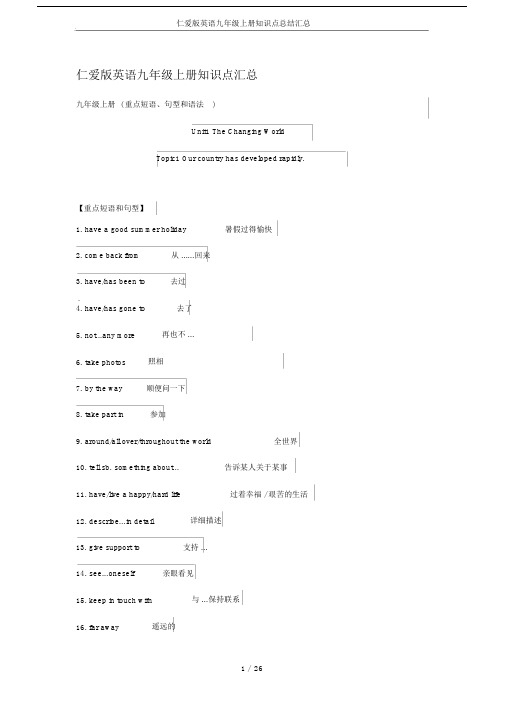
仁爱版英语九年级上册知识点总结汇总仁爱版英语九年级上册知识点汇总九年级上册 ( 重点短语、句型和语法)Unit1 The Changing WorldTopic1 Our country has developed rapidly.【重点短语和句型】1. have a good summer holiday 暑假过得愉快2. come back from 从 ......回来3. have/has been to 去过4. have/has gone to 去了5. not...any more 再也不 ...6. take photos 照相7. by the way 顺便问一下8. take part in 参加9. around/all over/throughout the world 全世界10. tell sb. something about... 告诉某人关于某事11. have/live a happy/hard life 过着幸福 / 艰苦的生活12. describe...in detail 详细描述13. give support to 支持 ...14. see...oneself 亲眼看见15. keep in touch with 与 ...保持联系16. far away 遥远的17. kinds/sorts of 各种各样的 ...18. not only...but also 不仅 ...而且 ...19. make progress 取得进步20. more than/over 多于21. develop/improve rapidly 迅速发展 / 改善22. tell sb. (not ) to do sth. 告诉某人(别)做某事23. ask sb. (not ) to do sth. 要求某人(别)做某事24. in order to do sth. 为了做某事25. have to do sth. 不得不做某事26. It's + 形容词 +for sb. to do sth. 对于某人来说做某事是...的27. why not do sth.=why don ’ t you为do什sth么不做某事28. succeed/be successful in doing sth. 成功地做某事29. dream about doing sth. 梦想做某事30. see/hear sb. do/doing sth. 看见 / 听见某人做 / 正在做某事【重点语法】现在完成时一. 现在完成时的基本结构肯定句:主语 +have/has+Ved (动词的过去分词)+其他否定句:主语 +have/has+not+Ved (动词的过去分词)+ 其他一般疑问句: Have/Has+主语+Ved (动词的过去分词)+ 其他特殊疑问句:特殊疑问词+一般疑问句语序(have/has+主语+过去分词+其他),把划线词去掉二. 现在完成时的用法1.现在完成时用来表示过去已经完成的动作对现在造成影响或后果。
仁爱英语九年级-Unit1-topic1知识点归纳
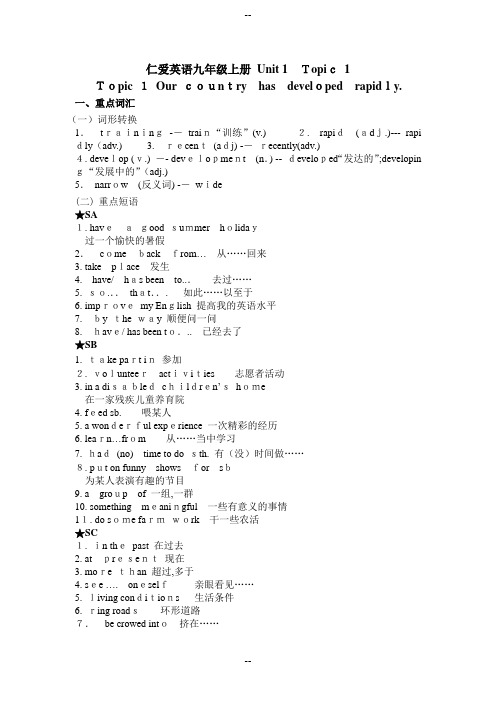
仁爱英语九年级上册Unit 1Topic1Topic 1Our country has developed rapidly. 一、重点词汇(一)词形转换1.training--train“训练”(v.)2.rapid(adj.)--- rapi dly(adv.) 3.recent(adj) --recently(adv.)4. develop (v.) -- development(n.) -- developed“发达的”;developin g“发展中的”(adj.)5.narrow(反义词) --wide(二)重点短语★SA1. haveagood summer holiday过一个愉快的暑假2.comebackfrom…从……回来3. take place发生4.have/has been to...去过……5. so...that... 如此……以至于6. improvemy English 提高我的英语水平7.by the way 顺便问一问8.have/ has been to... 已经去了★SB1. take part in参加2. volunteeractivities 志愿者活动3. in a disabledchildren’shome在一家残疾儿童养育院4. feed sb. 喂某人5. a wonderful experience 一次精彩的经历6. learn…from从……当中学习7. had(no)time to do sth. 有(没)时间做……8. put on funny showsfor sb为某人表演有趣的节目9. a group of 一组,一群10. something meaningful一些有意义的事情11. do some farmwork 干一些农活★SC1. in thepast 在过去2. atpresent现在3. more than 超过,多于4. see ….oneself亲眼看见……5. living conditions 生活条件6. ring roads环形道路7.be crowed into挤在……8. have the chanceto do sth. 有机会做某事9. receive agood education接受良好的教育10. keep in touch with sb byletter ortelegram通过书信或电报与某人取得联系11. far away遥远12.the reformand opening-up 改革开放13.tallerandbrighter 又高又明亮14. satisfy one’s needs 满足某人的需要15.not only…but also…不但……而且……16. enjoygoodmedical care享受很好的医疗保健17.what’s more 而且18. make rapid progress取得很大/快速进步19.succeedin doing sth成功地做某事20. rememberthe past 记住过去21. livein the present 立足现在22.dream about the future展望未来23. the course of……的过程★SD1. leisure activities休闲活动2.play an important part in在……中发挥重要作用3. playhide-and-seek捉迷藏4.play chess下棋5.in one'sspare/free time在某人空闲时6. spend ... on sth. 花费……在……上7. various kinds of各种各样8. both... and...不仅……而且……9. places of interest名胜古迹10.in theopen air 在户外二、重点句型。
仁爱英语九上unit1知识点整理和归纳

仁爱英语九上unit1知识点整理和归纳仁爱英语九上Unit 1知识点整理和归纳一、单词和短语1.decade:十年2.century:世纪3.progress:进步,进展4.invention:发明物5.technology:科技,技术munication:交流,通信7.transport:交通工具,运输8.revolution:革命,变革9.invention:发明10.discover:发现11.device:设备12.satellite:卫星13.electric:电的14.electronic:电子的15.digital:数字的16.wireless:无线的17.connect:连接18.transmit:传输19.access:接入,接近20.virtual:虚拟的21.telecommunication:电信work:网络23.global:全球的24.advantage:优势,有利条件25.disadvantage:劣势,不利条件26.develop:发展27.improve:改进,提高28.efficient:高效的29.convenient:便利的30.portable:便携式的31.traditional:传统的32.modern:现代的33.online:在线的34.offline:离线的35.interactive:互动的36.impact:影响37.benefit:受益,获益38.disadvantage:不利条件39.challenge:挑战40.opportunity:机会41.transform:改变42.transforminto:把变为43.essential:必不可少的44.efficient:高效的45.convenient:便捷的46.safe:安全的47.advanced:先进的48.revolutionary:革命性的49.amazing:令人惊奇的50.impressive:令人印象深刻的eful:有用的52.convenient:方便的53.popular:流行的54.powerful:强大的55.interactive:互动的二、重点句型和表达方式1.In the past decade, there have been many technological advances。
仁爱英语九年级上册Unit1-topic2知识点总结
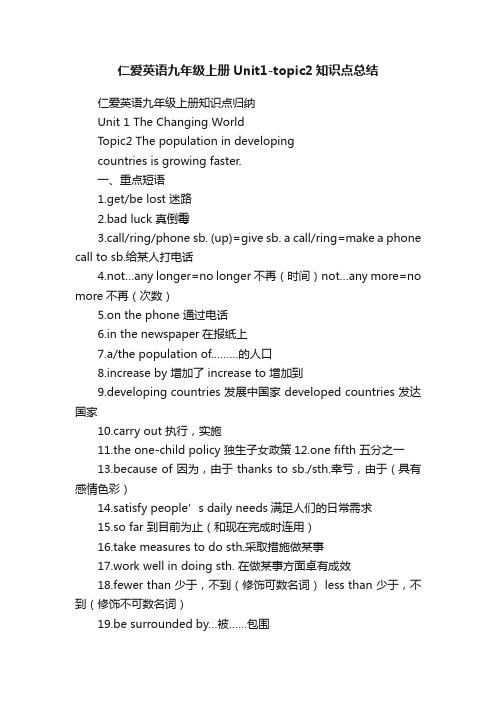
仁爱英语九年级上册Unit1-topic2知识点总结仁爱英语九年级上册知识点归纳Unit 1 The Changing WorldTopic2 The population in developingcountries is growing faster.一、重点短语1.get/be lost 迷路2.bad luck 真倒霉3.call/ring/phone sb. (up)=give sb. a call/ring=make a phone call to sb.给某人打电话4.not…any longer=no longer不再(时间)not…any more=no more不再(次数)5.on the phone 通过电话6.in the newspaper在报纸上7.a/the population of………的人口8.increase by 增加了 increase to 增加到9.developing countries 发展中国家 developed countries 发达国家10.carry out 执行,实施11.the one-child policy 独生子女政策12.one fifth 五分之一13.because of 因为,由于 thanks to sb./sth.幸亏,由于(具有感情色彩)14.satisfy people’s daily needs满足人们的日常需求15.so far 到目前为止(和现在完成时连用)16.take measures to do sth.采取措施做某事17.work well in doing sth. 在做某事方面卓有成效18.fewer than 少于,不到(修饰可数名词) less than 少于,不到(修饰不可数名词)19.be surrounded by…被……包围20.close to…接近于/在……附近21.discourage doing sth. 阻止做某事22.first of all 首先23.belong to 属于24.offer sb.sth.=offer sth. to sb.给某人提供某物二、单词转换1.luck n.幸运 lucky adj. 幸运的 luckily adv. 幸运地2.Russian. 俄罗斯 Russian n. 俄国人,俄语 adj.俄国的,俄国人的,俄语的3.social adj.社会的,社交的 society n.社会4.nature n.自然 natural adj. 自然的5.develop v. 发展 developed adj. 发达的developing adj. 发展中的 development n. 发展三、重点句型1.I have just called you.我刚刚给你打过电话。
仁爱版九年级英语上册Unit1单元知识要点

第一单元知识要点Unit1 Topic 1一.短语e back2.see sb do/doing sth3.feel sorry for4.have been to/gone to5.take photos6.take part in7.social activities8.during summer holidays9.disabled children10.spend…..doing/on sth11.learn sth from12.have no time to do13.do farm work14.chat on line15.have a hard life16.in detail17.afford children’seducatin18.child laborers19.in order to20.support their families21.work for22.give support to sb/sth23.get a good education24.receive good education25.by/in/on the way26.search ….for27.in the past28.nowadays29.little/a little / few / a few30.leisure activities31.work as32.with the development of33.have a balanced diet34.what’s more35.have a chance to do36.play musical instrument37.at present38.living conditions39.in the 1960s40.under poor conditions41.crowd into42.keep in touch with sb43.since /for44.not only ….but also45.sorts of46.on the Internet47.and so on48.make progress in sth49.remember the past50.live in the present51.dream about future52.happen to53.make preparations for54.draw up an outline55.thanks to56.in recent years57.see sth oneself二、语法结构have/has been tohave /has gone to三、书面表达1谈谈中国青少年发生的变化。
仁爱英语九年级上册Unit-1-Topic2重点笔记与知识点整合复习+综合训练题
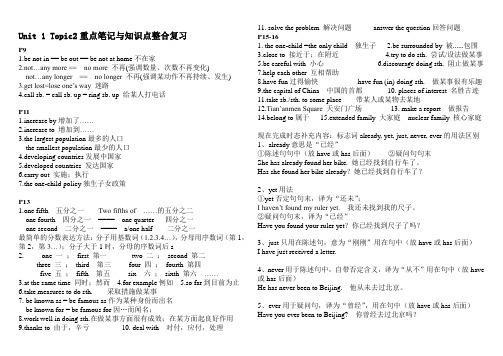
Unit 1 Topic2重点笔记与知识点整合复习P91.be not in == be out == be not at home不在家2.not…any more == no more 不再(强调数量、次数不再变化)not…any longer == no longer 不再(强调某动作不再持续、发生)3.get lost=lose one’s way 迷路4.call sb. = call sb. up = ring sb. up 给某人打电话P111.increase by增加了……2.increase to 增加到……3.the largest population最多的人口the smallest population最少的人口4.developing countries发展中国家5.developed countries 发达国家6.carry out 实施;执行7.the one-child policy独生子女政策P131.one fifth 五分之一Two fifths of ……的五分之二one fourth 四分之一==== one quarter 四分之一one second 二分之一==== a/one half 二分之一最简单的分数表达方法:分子用基数词(1.2.3.4…),分母用序数词(第1,第2,第3…);分子大于1时,分母的序数词后s2. one 一;first 第一two 二;second 第二three 三;third 第三four 四;fourth 第四five 五;fifth 第五six 六;sixth 第六……3.at the same time 同时;然而4.for example例如5.so far到目前为止6.take measures to do sth. 采取措施做某事7. be known as = be famous as作为某种身份而出名be known for = be famous for因…而闻名;8.work well in doing sth.在做某事方面很有成效;在某方面起良好作用9.thanks to 由于,辛亏10. deal with 对付,应付,处理11. solve the problem 解决问题answer the question回答问题P15-161. the one-child =the only child 独生子2.be surrounded by 被......包围3.close to 接近于;在附近4.try to do sth. 尝试/设法做某事5.be careful with 小心6.discourage doing sth. 阻止做某事7.help each other 互相帮助8.have fun过得愉快have fun (in) doing sth. 做某事很有乐趣9.the capital of China 中国的首都10. places of interest 名胜古迹11.take sb./sth. to some place 带某人或某物去某地12.Tian’anmen Square 天安门广场13. make a report 做报告14.belong to属于15.extended family 大家庭nuclear family 核心家庭现在完成时态补充内容:标志词already, yet, just, never, ever的用法区别1、already意思是“已经”①陈述句句中(放have或has后面)②疑问句句末She has already found her bike. 她已经找到自行车了。
仁爱英语九年级上册u1知识点总结

仁爱英语九年级上册u1知识点总结在仁爱英语九年级上册第一单元中,我们学习了一些重要的知识点,这些知识点对于我们的英语学习和提高都非常重要。
通过对这些知识点的总结和归纳,我们能更好地理解和应用它们。
一、名词性物主代词和形容词性物主代词的区别在单元中,我们学习了名词性物主代词和形容词性物主代词的用法和区别。
名词性物主代词用来代替名词,而形容词性物主代词则用来修饰名词。
例如,“This is my book.”中的"my"就是名词性物主代词,代替了名词"book";而在句子"Where is your book?"中,"your"则是形容词性物主代词,修饰了名词"book"。
二、动词及时态的使用动词是句子的核心成分,也是表达动作和状态的重要手段。
在学习第一单元时,我们学习了一些常见的动词及其时态的使用。
例如,一般现在时表示经常发生的动作或存在的状态,一般过去时表示过去发生的动作或存在的状态。
我们要根据具体的语境来选择合适的动词时态,准确地表达自己的意思。
三、比较级和最高级的形式和用法比较级和最高级是用来比较程度的形式。
在第一单元中,我们学习了形容词比较级和最高级的构成方法和用法。
比较级用来比较两个人或物的不同,最高级则用来表示三个或三个以上人或物之间的比较。
例如,“Tom is taller than Tim.”中,“taller”就是形容词的比较级形式。
当我们进行比较时,要注意形容词的变化规则,并使用正确的比较级或最高级形式。
四、被动语态的构成和用法被动语态用来强调某个动作的承受者,而不是执行者。
在学习第一单元时,我们也学习了被动语态的构成和用法。
被动语态的构成是由be动词加上过去分词形式而成。
例如,“The book was written by him.”中,“was written”就是被动语态形式。
仁爱版九年级上册英语Unit-1-Topic-1-知识点总结

仁爱版九年级上册英语U n i t-1-T o p i c-1-知识点总结(总8页)--本页仅作为文档封面,使用时请直接删除即可----内页可以根据需求调整合适字体及大小--Unit 1 Topic 1※ 短语集锦a good summer holiday 暑假过得好place 发生3. have / has been to 去过某地 (去而已归)have / has gone to 去了某地(去而未归)4. so many / few + 可数名词复数+ that… 如此多…以至于…So much / little +不可数名词+ that…如此少的…以至于…5. a proper place to take photos / pictures一个适合拍照的地方6. by the way 顺便问一下7. There goes the bell = The bell is ringing = That’s the bell 铃声响了8. take part in = join in = be in +某项活动join + sb / club / team /组织9. tell a story to sb 给某人讲故事10. feed the disabled children 喂残疾儿童11. What a wonder experience! 多么精彩的一次经历啊!12. learn a lot from … 从…中学习到很多13. have no time to do sth 没有时间做某事14. chat on line 上网聊天15. around the world = all over the world 全世界16. have a hard life = live a hard life 过着艰苦的生活Life is hard for sb 对某人来说生活是艰难的17. in detail 详细地18. in the past 在过去at present 现在in the future 将来19. Is that so = Really 真的吗真是那样吗20. in order to = so that = in order that 为的是;以便于in order to 后+动词短语so that / in order that后+ 句子21. support a family 供养一个家庭give support to 给…提供帮助22. day and night 日日夜夜23. What about you = How about you 你呢24. Now our country has developed rapidly.现在我们国家发展迅速developed:发达的developing:发展中的development:发展eg:1)China is a developing country.2) Japan is the only developed country in Asia.3) With the development of China, people’s living conditionsbecome better and better.25. get / have / receive a good education 接受良好的教育26. have a balanced diet 均衡膳食27. more than = over 超过; 多余28. see … oneself 亲自看到29. in the 1968s 在二十世纪六十年代30. the living conditions 生活条件31. have a chance to do 有机会做某事32. keep in touch with 与某人保持联系get in touch with 与某人取得联系33. by letter or telegram 靠信件或电报34. things to choose from 供挑选的东西35. sorts of = kinds of 多种36. not only … but also … 不但….而且…37. What’s more 而且38. make progress 取得进步make rapid progress 取得快速的进步make great progress 取得巨大的进步39. succeed in doing sth = be successfulin doing sth 成功做某事eg: Beijing succeeded in hosting the 29thOlympic Games in 2008. (同义句)= Beijing was successful in hosting the 29thOlympic Games.40. It’s important for sb to do sth 做…对某人是重要的41. dream about / of doing sth 梦想做某事42. watch a movie in the open air 看露天电影43. with the help of = with one’s help 在某人的帮助下44. draw up 拟定;起草45. t hanks to … = because of 多亏;由于over = look over 检查※精讲精析Section A1.have / has been to 去过某地(去而已归)与ever, never, before及次数等连用have / has gone to 去了某地(去而未归)have / has been in 表示在…已经多久了eg:用been, gone, in填空1)_ Where have you_ I have to a shopping center.2)_ Where is Maria_ She has to Cuba.3)_ Has your mother ever there?4)5)_ No, she has never there.6)She has to England. She will come back in ten days.7)He has to Xian many times.8)He has been China for two years.9)How long have you been in this city?10)11)2. so ... that ... / such ... that ...都可意为如此...以至于...区别如下:1)so +形容词 + a / an + 单数名词= such + a / an + 形容词 + 单数名词eg:1) It is so moving a movie that all of us can’t help crying.(同义句)= It is such a moving movie that all of us can't help crying.2) It is so interesting a book that I read it again and again. (同义句)2) 如果名词是可数名词复数或不可数名词时这时只能用such , 不能用so3) 如果名词前有many , much , little, few时只能用so,不能用such.练习:用so / such 填空1) The boy is young that he can’t go to school.2) She told us a funny story that we all laughed.3) He has few books to read that he has to borrow some from the school library.4) It is a tall building that I can’t see its top.5) The old man is ill that he can’t get up.6) It was fine weather that we went swimming last weekend.7) They are small children that they can’t go to school.8) She speaks English well that the teacher praises(表扬)her.9) There is little bread that it is not enough for many people.10) It is delicious food that we all like it very much.3. There goes the bell.(同义句)= The bell is ringing.= That’s the bell.4.I want to work hard to make my English better.(同义句)= I want to work hard to improve myEnglish.注意:so ... that 句型的否定可与too ... to 句型和not enough ... to do 句型进行转换eg:1) Tom is so young that ha can’t go to school. (同义句)= Tom is too young to go to school.= Tom isn’t old enough to go to school.2)The desk is so heavy that I can’t move it. (同义句)= The desk is too heavy for me to move.= The desk isn’t light enough for me to move.3)The apple tree is so tall that we can’t reach it.(同义句)= The apple tree is too tall for us to reach.= The apple tree isn’t short en ough for us to reach.5.1) I have been to Beijing.(提问)Where have you been?2) Lily has been to Cuba.(提问)Where has lily been?3) My sister has gone to the gym.(提问)Where has your sister gone?4) They have gone to Shanghai.(提问)Where have they goneSection B1.in a disabled children’s home在残疾儿童之家2.experience 在此处意为经历What a wonderful experience!一次多么棒的经历啊!experience还可意为经验讲,作经验讲时它是一个不可数名词eg: The teacher has a lot of teaching experience.这个老师有许多教学经验。
(最新)仁爱版英语九年级上册知识点汇总Unit1Topic1
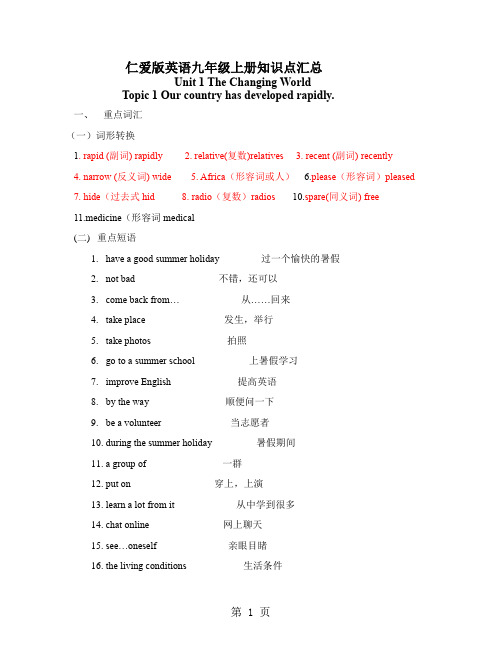
仁爱版英语九年级上册知识点汇总Unit 1 The Changing WorldTopic 1 Our country has developed rapidly.一、重点词汇(一)词形转换1. rapid (副词) rapidly2. relative(复数)relatives3. recent (副词) recently4. narrow (反义词) wide5. Africa(形容词或人)6.please(形容词)pleased7. hide(过去式hid8. radio(复数)radios 10.spare(同义词) free11.medicine(形容词medical(二)重点短语1.have a good summer holiday 过一个愉快的暑假2.not bad 不错,还可以e back from… 从……回来4.take place 发生,举行5.take photos 拍照6.go to a summer school 上暑假学习7.improve English 提高英语8.by the way 顺便问一下9.be a volunteer 当志愿者10.during the summer holiday 暑假期间11.a group of 一群12.put on 穿上,上演13.learn a lot from it 从中学到很多14.chat online 网上聊天15.see…oneself 亲眼目睹16.the living conditions 生活条件17.be crowded into 挤进……里18.ring roads 环形路19.receive a good education 接受良好的教育20.keep in touch with 和…..保持联系21.lose in touch with 和…..失去联系22.in the future 在未来,在将来23.relatives far away 远方的亲戚24.work for … 为……工作25.feel sorry for… 对……深表同情26.a disabled children’s home一家残疾儿童养育院27.the reform and opening-up 改革开放28.satisfy people’s needs 满足人们的需求29.medical care 医疗护理30.what’s more 而且,更重要的是31.make great progress 取得巨大的进步32.succeed in doing sth. 成功地做某事33.remember the past 记住过去34.live in the present 立足于现在35.dream about the future 展望未来36.play an important part in 在……方面起重要作用37.get together 集会,集聚38.play hide-and-seek 捉迷藏39.play cards 打扑克40.play chess 下棋41.in one‘ s spare time 在某人空闲的时间42.chat on the Internet 在网上聊天43.in recent years 在近年来44.places of interest 名胜45.make a tour abroad 到国外旅行46.get a good education 获得良好的教育47.make progress 取得进步三、重点句型1.You have just come back from your hometown. 你刚刚从你的家乡返回。
仁爱英语九年级上册Unit1-topic3知识点总结
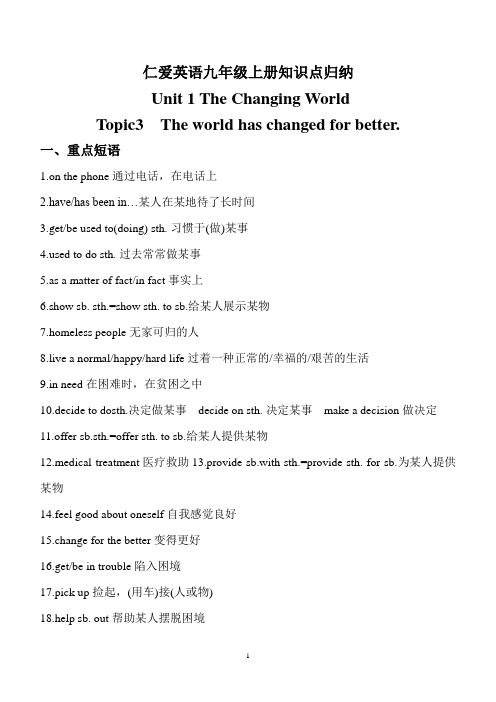
仁爱英语九年级上册知识点归纳Unit 1 The Changing WorldTopic3 The world has changed for better.一、重点短语1.on the phone 通过电话,在电话上2.have/has been in…某人在某地待了长时间3.get/be used to(doing) sth. 习惯于(做)某事ed to do sth. 过去常常做某事5.as a matter of fact/in fact事实上6.show sb. sth.=show sth. to sb.给某人展示某物7.homeless people 无家可归的人8.live a normal/happy/hard life 过着一种正常的/幸福的/艰苦的生活9.in need 在困难时,在贫困之中10.decide to dosth.决定做某事decide on sth. 决定某事make a decision 做决定11.offer sb.sth.=offer sth. to sb.给某人提供某物12.medical treatment 医疗救助13.provide sb.with sth.=provide sth. for sb.为某人提供某物14.feel good about oneself 自我感觉良好15.change for the better 变得更好16.get/be in trouble 陷入困境17.pick up 捡起,(用车)接(人或物)18.help sb. out 帮助某人摆脱困境19.the cause of 导致……的原因the result of ……的结果the reas on for ……的原因20.on purpose 故意21.have a problem with…有……问题22.think of… as…把……视为……23.raise one’s children抚养孩子24.afford sth. for sb. 为某人支付/担负某物 afford to do sth. 担负得起做某事25.make contributions to(doing)sth.在(做)某事方面做出贡献26.as a result 结果27.without th e help of…没有……的帮助lions of 数百万29.according to 据……所说,按……所报道30.plenty of 大量的二、单词转换1.visit v./n.参观,访问,游览 visitor n.参观者,来访者2.chemical adj.化工的,化学的 chemistry n.化学,化学物质3.homeless adj.无家的 homelessness n.无家可归4.treat v.对待,治疗 treatment n.疗法,治疗5.basic adj.基本的,基础的 base n.基础6.important adj.重要的 importance n.重要性,重要三、重点句型1.You have been in New York for a long time.你已经在纽约待了很长时间了。
仁爱版九年级英语上册unit1重要知识点
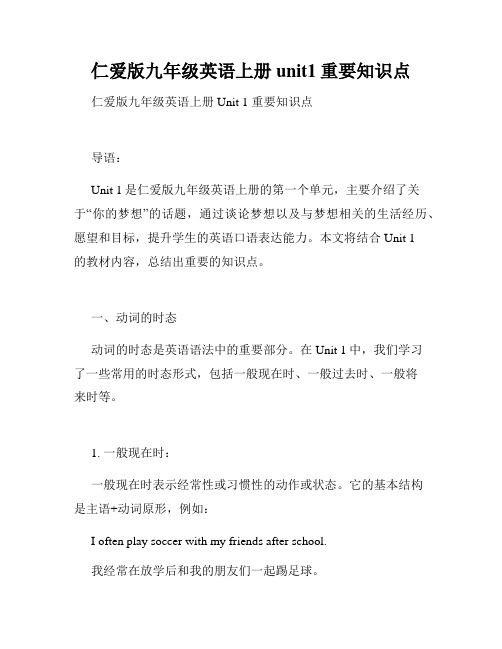
仁爱版九年级英语上册unit1重要知识点仁爱版九年级英语上册Unit 1 重要知识点导语:Unit 1是仁爱版九年级英语上册的第一个单元,主要介绍了关于“你的梦想”的话题,通过谈论梦想以及与梦想相关的生活经历、愿望和目标,提升学生的英语口语表达能力。
本文将结合Unit 1的教材内容,总结出重要的知识点。
一、动词的时态动词的时态是英语语法中的重要部分。
在Unit 1中,我们学习了一些常用的时态形式,包括一般现在时、一般过去时、一般将来时等。
1. 一般现在时:一般现在时表示经常性或习惯性的动作或状态。
它的基本结构是主语+动词原形,例如:I often play soccer with my friends after school.我经常在放学后和我的朋友们一起踢足球。
2. 一般过去时:一般过去时表示过去某个时间发生的动作或状态。
它的基本结构是主语+动词过去式,例如:Last night, I watched an interesting movie with my family.昨晚,我和我的家人一起看了一部有趣的电影。
3. 一般将来时:一般将来时表示将来某个时间要发生的动作或状态。
它的基本结构是主语+will+动词原形,例如:Next week, I will visit my grandparents in the countryside.下周,我将去乡下看望我的祖父母。
二、句型的运用在Unit 1中,我们学习了一些常用的句型,能够帮助我们更好地表达自己的梦想和愿望。
1. What do you want to be when you grow up?当你长大后你想要成为什么?这个句型用来询问对方将来的职业梦想,可以用来提高学生对未来的思考和规划能力。
2. I want to be a/an...我想要成为一个...通过这个句型,我们可以表达自己的梦想和愿望,向他人展示我们对某个职业的向往。
3. Why do you want to be a/an...?你为什么想要成为一个...?这个句型用来询问对方为什么有这样的职业梦想,帮助学生思考自己对某个职业的认知和理解。
仁爱版九年级英语上册Unit1-知识点总结

仁爱版九年级英语上册U n i t1-知识点总结(总4页)本页仅作为文档页封面,使用时可以删除This document is for reference only-rar21year.MarchUnit1 知识点总结1. 主语+have/has been to + 地点“去过某地” (已返回)主语+have/has gone to +地点“去了某地” (未回来)主语+have/has been in +地点+for +段时间(待在某地,动作可以延长一定时间,后面常接段的时间)She has been in Japan for 2 year.She has been to Japan.She has gone to Japan.▲地点是名词须接to ,如果地点是副词则不接to。
Tom has been there.▲对地点提问用:where2.频度副词already,yet ,just,ever,never,在现在完成时中的作用(1)already 用在肯定句,用与句中,句尾均可,“已经”I’ve finished my homework already.I’ve already finished my homework .(2)yet 用于否定句或疑问句,“还” ,用于句末。
在现在完成时的用法中,肯定句常用already,改用否定句和一般疑问句时常把already改为 yet(放句末)。
I have already found him.Have you found him yet ?(3)Just位于谓语动词前。
“刚刚” (也可以用于一般现在时,过去时态)He has just come back from France.(4) ever 多用与一般疑问句,否定句和条件状语从句中,“曾经”Have you ever been to France? No, I haven’t. /Yes,I have.If you ever happen to come here ,be sure to visit us.(5)never 多用于否定的陈述句中,“从不……” (反义词是ever)I have never travelled on a plane.(变成一般疑问句)Have you ever travelled on a plane?He is never late for school. (它还可以用于其他时态中)(6)before 做副词时,”从前“ ,句中谓语常用现在完成时和过去时。
- 1、下载文档前请自行甄别文档内容的完整性,平台不提供额外的编辑、内容补充、找答案等附加服务。
- 2、"仅部分预览"的文档,不可在线预览部分如存在完整性等问题,可反馈申请退款(可完整预览的文档不适用该条件!)。
- 3、如文档侵犯您的权益,请联系客服反馈,我们会尽快为您处理(人工客服工作时间:9:00-18:30)。
Unit 1 The Changing WorldTopic 1 Our country has developed rapidly.I. 单词名词1. volunteer 志愿者【用法】单数名词,复数加-s。
I was a ________ in a disabled children’s home. 我在残疾儿童之家做志愿者。
We need some ________ to clean up the room. 我们需要一些志愿者打扫房屋。
I took part in some ________activities during the summer holidays. 我在暑假参加了一些志愿者活动。
2. bell 钟(铃)声;铃,钟【用法】表示“钟(铃)声”是不可数名词;表示“钟、铃”是可数名词,复数为bells。
The ______ drew the children out of the houses. 铃声把孩子们从屋子里引出来。
I had just enough time to finish eating before the ______ rang. 我在铃响之前正好有时间吃完。
My brother was born on a Sunday, when all the church _______ were ringing. 我的弟弟出生于一个星期天,当时所有教堂的钟都在鸣响。
【搭配】ring a bell 打铃3. Africa 非洲【构词】________ 非洲的;非洲人4. rope 绳子,绳索【用法】既可用作不可数名词也可用作可数名词,rope 用作可数时复数是________。
This ladder is made of _______. 这架梯子使用绳索做的。
(不可数名词)He used a _______ to mark off the circle. 他用绳索把那个圈围了起来。
(可数名词)It’s clever of him to come down without _______. 他很聪明,不用绳索就能下来。
(可数名词)5. communication 交流;交往【用法】表示“交流”一般用作不可数名词;表示“交往”可用作可数名词。
有时communication 也表示“交通”。
We are in ________ with them on the matter. 我们正在就这件事和他们交换意见。
Snowstorms have stopped all _________ with the north. 北部的一切交通均为暴风雪所阻。
A _________ will be opened between the two cities. 这两个城市间的交通即将开通。
【辨析】communication, traffic, transportation6. report 报告;汇报【用法】指通过调查作出正式说明、分析和判断。
在英式英语里也可指学生的“成绩报告单”或雇员的“工作鉴定书”。
是可数名词,复数加-s。
Let’s listen in to the ___________. 我们来收听天气预报吧。
Every week they received _________ to what was going on. 每星期他们都收到有关事情进展的报告。
7. relative 亲属,亲戚【用法】可数名词,复数直接加-s。
My uncle is my nearest living _________. 叔叔是我最近的亲人。
She has no ________ in town. 她城里没有亲戚。
8. telegram 电报;电文【用法】作可数名词,表示“电报”,是用电信号传递文字、图表等的通信方式。
与不定冠词a连用可以表示“一份电报”。
I sent a ________ to him. 我打电报给他。
I've got all your telegrams. 我已经收到了你所有的电报。
9. machine 机器,机械【用法】可数名词,复数加-s。
They advised the peasants on how to use the ________. 他们指导农民如何使用这台机器。
That factory bought some printing ________ from Germany last year. 去年那家工厂从德国购买了一批印刷机。
10. progress 进步;进展;逐步发展【用法】通常用作不可数名词,一般不用不定冠词。
但当其有形容词等修饰语时,可与a连用;表示“各方面都取得进展”时可用复数形式。
He often comes here to check on my _________. 他常常来这里看看我的进展情况。
I am glad that you are making so great a _________ in English. 你在英语方面取得这么大的进步,我很高兴。
【搭配】make progress 取得进步Since then she has _________. 此后她取得了很大进步。
11. chess 国际象棋【用法】指国际象棋这种活动是不可数名词,不用冠词。
I am _________ with my father. 我正在和爸爸下棋。
The twin sisters played a game of ________ just now. 这一对孪生姐妹刚下了一盘棋。
12. radio 收音机【用法】radio 作“收音机”解时,是可数名词,其前通常加冠词the 或a ,其复数形式是radios 。
radio 作“无线电广播台,电台”解时,其前通常加冠词the 。
My father bought two ________ for us last year. 去年我爸爸给我们买了两台收音机。
He listens to _______ at seven in the morning. 我早晨七点听收音机。
形容词13. disabled 残疾的,残废的【用法】用作形容词可作表语和定语。
但无比较级。
He is ________, he lost a leg in an accident. 他有残疾,在一次事故中他失去了一条腿。
He has helped many _________ children. 他已经帮助了很多残疾儿童。
【拓展】the + disabled 表示“残疾人”这一类。
It is our duty to help __________. 帮助残疾人是我们的责任。
14. narrow 狭窄的【用法】指空间、场所、物品或范围的狭窄。
The bridge is too ________ for two cars to pass. 这桥太窄,并排通不过两辆车。
She drove her car through the _______ streets. 她驾驶着车穿过狭窄的街道。
15. various 各种各样的;多姿多彩的【用法】指具有各种不同特征的,强调种类的不同、事物的多样性等。
在句中多用作定语。
We have looked at ________ houses, but have decided to buy this one. 我们已看了各式各样的房子,现决定买这一栋。
There are _______ ways of cooking an egg. 烹饪鸡蛋有各种各样的方法。
【辨析】different 与various 不同different 着重在事物之间的差别,可指事物之间的本质差别,也可指事物之间的非本质的差别;various 指同范围内的不同种类,不强调本质的差别。
We have ________ plans. 我们有不同的计划。
I met the old man at ____________ and ___________. 我在不同的时间和不同的地点遇到过这位老人。
16. medical 医学的;医疗的【用法】通常用作定语,修饰名词,放在名词之前。
People can enjoy good __________. 人们可以享受良好的医疗服务。
The doctor said that the old man is beyond __________ and will soon die. 医生说这个老人已经无药可救,快要死了。
17. pleased 高兴的【用法】表示“感到高兴的”,修饰人,通常作表语。
常见搭配是be pleased with ,表示“对……满意”。
Our teacher was very ___________ with us. 我们的老师对我们非常满意。
【构词】please; pleased; pleasant; pleasure【辨析】please, pleasant, pleased【搭配】with pleasure = OK, all right 和sure; It ’s my pleasure. 不用谢--Would you like to help me with my English? 你愿意帮我学英语吗?--_______________. 很愿意为你效劳。
--Thank you for giving me so much help. 谢谢给我这么多帮助。
--_______________. 不用谢。
18. rapid 迅速的,快速的 【用法】是正是用语,可作定语或表语,指运动的高速度;也可用于抽象意义上“快速”。
He made such _________ progress that his parents were very glad. 他取得了如此快的进步以至于他的父母都很高兴。
I often jump over a line or two in _______ reading. 我在快速阅读时常常跳过一两行。
My watch is rapid. 我的手表快了。
【构词】rapidly 迅速地;快速地【辨析】fast, rapid; quick【用法】可用作定语或表语,无比较等级。
I have no ________. 我没有闲钱。
He was reading hard and had less _________. 他在努力读书,很少有空闲时间。
Is this seat ________? 这个座位没人坐吗?20. recent 最近的【用法】指不久前到现在的一段时间,无比较等级;可作定语或表语。
